Date:
6 Oct. 2022 -- 20 Oct. 2022
Time:
19:00-21:00, 21:00-23:00 (Beijing)
13:00-15:00, 15:00-17:00 (Berlin)
7:00-9:00, 9:00-11:00 (New York)
Chair:
Zhiguo Shi, Zhejiang University, China;
Martin Haardt, Ilmenau University of Technology, Germany
Wei Liu, University of Sheffield, UK
Local Chair:
Chengwei Zhou, Zhejiang University, China;
Qianqian Yang, Zhejiang University, China
Program:
Date | Beijing Time | Speaker | Affiliation | Title | Zoom ID |
10.6 | 21:00-23:00 | Xiao-Ping (Steven) Zhang | Toronto Metropolitan University | Localization and Tracking for Internet of Things | ID: 861 432 84440 Password:960132 |
10.8 | 22:00-23:00 | Dominic K. C. Ho | University of Missouri | Localization Irrespective of Source Range: Fundamental Concept | ID: 836 023 52702 Password:123543 |
10.10 | 19:00 -21:00 | Yuejie Chi | Carnegie Mellon University | Reinforcement Learning: Fundamentals, Algorithms, and Theory | ID: 893 040 43445 Password:236336 |
21:00 -23:00 | Baochun Li | University of Toronto | Federated Learning in an Edge-Cloud Coordinated World: Facts or Fiction? | ||
10.11 | 19:00 -21:00 | Hing Cheung So | City University of Hong Kong | Fast and Robust Rank-One Matrix Recovery via M-Estimation and Half-Quadratic Optimization | ID: 812 386 82896 Password:493670 |
21:00 -23:00 | Yao Xie | Georgia Institute of Technology | Robust and Sequential Detection and Prediction | ||
10.12 | 19:00 -21:00 | Wei-Ping Zhu | Concordia University | Recent Advance in Speech Enhancement with Deep Learning | ID: 885 571 20268 Password:706489 |
21:00 -23:00 | Xiang-Gen Xia | University of Delaware | OFDM Radar and Communications: Comparison and SAR Imaging | ||
10.13 | 19:00 -21:00 | Yue Lu | Harvard University | Understanding the Universality Phenomena in High-Dimensional Estimation and Learning: Some Recent Progresses | ID: 858 179 06662 Password:429288 |
21:00 -23:00 | Maria Sabrina Greco | University of Pisa | Cognitive Radars: Some Application and Some Hint on the Future | ||
10.14 | 19:00 -21:00 | Rodrigo C. de Lamare | Pontifical Catholic University of Rio de Janeiro, Brazil, and University of York, UK | Energy-efficient Distributed Learning: Diffusion and Federated Algorithms with Applications to IoT Networks | ID: 894 849 49435 Password:191035 |
21:00 -23:00 | Yik-Chung WU | The University of Hong Kong | Parameter Tuning-Free Matrix and Tensor Decompositions | ||
10.16 | 21:00 -23:00 | Waheed U. Bajwa | Rutgers University-New Brunswick | Scalable Algorithms for Distributed Principal Component Analysis | ID: 879 029 86252 Password:692672 |
10.17 | 19:00 -21:00 | André L. F. de Almeida | Federal University of Ceara | Tensor-based Approach for IRS Phase-Shift Feedback Control | ID: 820 385 06005 Password:763713 |
21:00 -23:00 | Z. Jane Wang | University of British Columbia | Exploring Interpretability of Deep Convolutional Neural Networks | ||
10.18 | 19:00 -21:00 | Michael Muma | Technical University of Darmstadt | Ultra-High-Dimensional Signal Processing and Statistical Learning for Biomedical Data | ID: 893 030 55024 Password: 796433 |
21:00 -23:00 | Xavier Mestre | Telecommunications Technology Center of Catalonia | Signal Processing with Large Dimensional Observations: a Random Matrix Theory Approach | ||
10.19 | 19:00 -21:00 | Elias Aboutanios | University of New South Wales | TBD | ID: 862 630 25133 Password: 361641 |
21:00 -23:00 | Antonio De Maio | University of Napoli Federico II | RCS Measurements of UAV: Statistical Analysis and Radar Detection Performance | ||
10.20 | 19:00-21:00 | Nuria González Prelcic | North Carolina State University | Hybrid Model/Data Driven Strategies for Joint Localization and Communication at mmWave | ID: 896 809 12118 Password: 390346 |
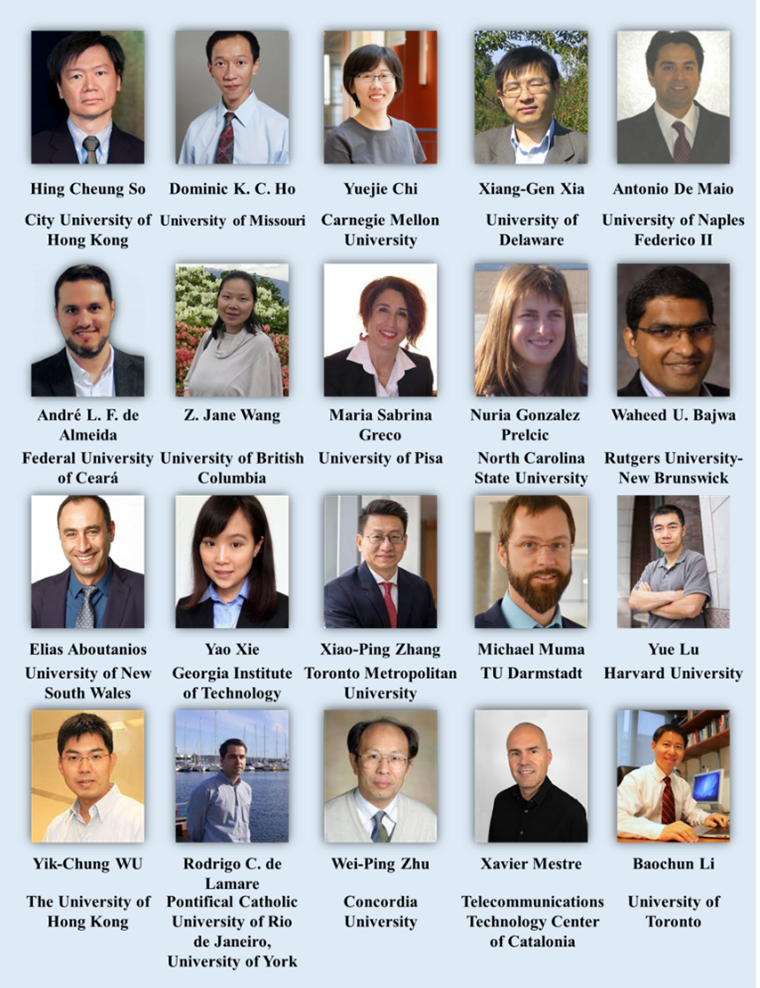
Sponsorship:
Sponsor:
Zhejiang University
Co-sponsor:
IEEE circuits and systems society
Radar Society of Chinese Institute of Electronics
Hangzhou Future Sci-tech City
Organizer:
Graduate School of Zhejiang University
State Key Laboratory of Industrial Control Technology
Key Laboratory of Collaborative Sensing and Autonomous Unmanned Systems of Zhejiang Province
Free registration:
Please click this link https://jinshuju.net/f/GfmvQz or scan the QR code below to sign up for the international workshop.
Please contact luninglin@zju.edu.cn if you have any questions.

P.S. Detailed information for the invited speakers:

Toronto Metropolitan University
Title of the talk:
Localization and Tracking for Internet of Things
Xiao-Ping (Steven) Zhang received B.S. and Ph.D. degrees from Tsinghua University, in 1992 and 1996, respectively, both in Electronic Engineering. He holds an MBA in Finance, Economics and Entrepreneurship with Honors from the University of Chicago Booth School of Business, Chicago, IL.
Since Fall 2000, he has been with the Department of Electrical, Computer and Biomedical Engineering, Toronto Metropolitan University (formerly Ryerson University), where he is now Professor, Director of Communication and Signal Processing Applications Laboratory (CASPAL). He has served as Program Director of Graduate Studies. He is cross appointed to the Finance Department at the Ted Rogers School of Management at Ryerson University. He was Visiting Scientist at Research Laboratory of Electronics (RLE), Massachusetts Institute of Technology, in 2015 and 2017. His research interests include statistical signal processing and big data analytics, multimedia content analysis, sensor networks and IoT, machine learning/AI, and applications in bioinformatics, finance, and marketing. He is a frequent consultant for biotech companies, such as Applied Biosystems and Celera Genomics. He also consults for investment firms and hedge funds. He is cofounder and CEO for EidoSearch, an Ontario based company offering a content-based numerical search and analysis engine for financial data.
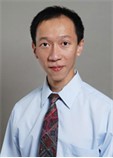
University of Missouri
Title of the talk:
Localization Irrespective of Source Range: Fundamental Concept
Dominic K. C. Ho was born in Hong Kong. He was a research associate in the Royal Military College of Canada, a member of scientific staff at the Bell-Northern Research, Montreal, Canada, and a faculty member in the Electrical Engineering Department at the University of Saskatchewan, Saskatoon, Canada. He joined the University of Missouri in 1997 and is a professor in the Department of Electrical Engineering and Computer Science. His research interests are in sensor array processing, source localization, subsurface object detection, wireless communications and adaptive processing. Ho has published over 130 journal papers and 170 conference articles. He was active in the ITU-T standard developments, and served as an associate editor of the IEEE Transactions on Signal Processing and IEEE Signal Processing Letters. He was the chair of Sensor Array and Multichannel Processing Technical Committee of the IEEE Signal Processing Society, and a technical chair of the 2016 IEEE International Conference on Acoustics, Speech and Signal Processing. He has received the junior faculty research award, the senior faculty research award and the teaching award. He is a Fellow of the IEEE.
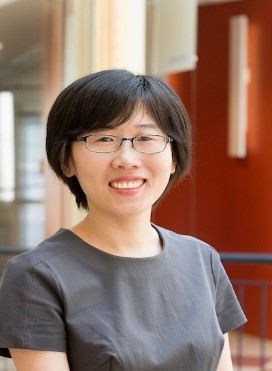
Carnegie Mellon University
Title of the talk:
Reinforcement Learning: Fundamentals, Algorithms, and Theory
Yuejie Chi received the B.E. degree (Hons.) in electrical engineering from Tsinghua University, Beijing, China, in 2007, and the M.A. and Ph.D. degrees in electrical engineering from Princeton University, in 2009 and 2012, respectively. She was with The Ohio State University from 2012 to 2017. Since 2018, she has been an Associate Professor with the Department of Electrical and Computer Engineering, Carnegie Mellon University, where she held the Robert E. Doherty Early Career Development Professorship, from 2018 to 2020. Her research interests lie in the theoretical and algorithmic foundations of data science, signal processing, machine learning, and inverse problems, with applications in sensing systems, broadly defined. Among others, she was a recipient of the Presidential Early Career Award for Scientists and Engineers (PECASE), the inaugural IEEE Signal Processing Society Early Career Technical Achievement Award for contributions to high-dimensional structured signal processing, and named the 2021 Goldsmith Lecturer by the IEEE Information Theory Society. She currently serves as an Associate Editor for IEEE Transactions on Information Theory, IEEE Transactions on Signal Processing, and IEEE Transactions on Pattern Recognition and Machine Intelligence.
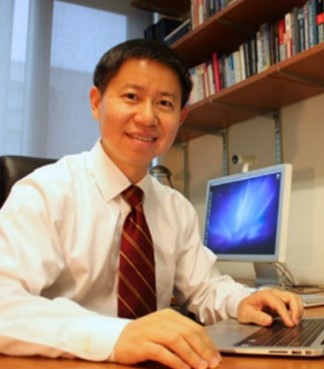
University of Toronto
Title of the talk:
Federated Learning in an Edge-Cloud Coordinated World: Facts or Fiction?
Baochun Li (F) received the BE degree from the Department of Computer Science and Technology, Tsinghua University, China, in 1995 and the MS and PhD degrees from the Department of Computer Science, University of Illinois at Urbana-Champaign, Urbana, in 1997 and 2000, respectively. Since 2000, he has been with the Department of Electrical and Computer Engineering, University of Toronto, where he is currently a professor. He holds the Nortel Networks Junior Chair in Network Architecture and Services from October 2003 to June 2005, and the Bell Canada Endowed Chair in Computer Engineering since August 2005. His research interests include cloud computing, large-scale data processing, computer networking, and distributed systems. In 2000, He was the recipient of the IEEE Communications Society Leonard G. Abraham Award in the Field of Communications Systems. In 2009, he was a recipient of the Multimedia Communications Best Paper Award from the IEEE Communications Society, and a recipient of the University of Toronto McLean Award. He is a fellow of the IEEE and a member of the ACM.
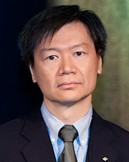
City University of Hong Kong
Title of the talk:
Fast and Robust Rank-One Matrix Recovery via M-Estimation and Half-Quadratic Optimization
Hing Cheung So was born in Hong Kong. He received the B.Eng. degree in electronic engineering from the City University of Hong Kong, Hong Kong, in 1990, and the Ph.D. degree in electronic engineering from The Chinese University of Hong Kong, Hong Kong, in 1995.
From 1990 to 1991, he was an Electronic Engineer with the Research and Development Division, Everex Systems Engineering Ltd., Hong Kong. From 1995 to 1996, he was a Post-Doctoral Fellow with The Chinese University of Hong Kong. From 1996 to 1999, he was a Research Assistant Professor with the Department of Electronic Engineering, City University of Hong Kong, where he is a professor. His research interests include detection and estimation, fast and adaptive algorithms, multidimensional harmonic retrieval, robust signal processing, source localization, and sparse approximation.
Dr. So was an Elected Member of the Signal Processing Theory and Methods Technical Committee of the IEEE Signal Processing Society, from 2011 to 2016, where he was the Chair of the Awards Subcommittee from 2015 to 2016. He has been on the editorial boards of IEEE Signal Processing Magazine from 2014 to 2017, the IEEE Transactions on Signal Processing from 2010 to 2014, Signal Processing since 2010, and Digital Signal Processing since 2011. He was also the Lead Guest Editor of the IEEE Journal of Selected Topics in Signal Processing, special issue on Advances in Time/Frequency Modulated Array Signal Processing in 2017.
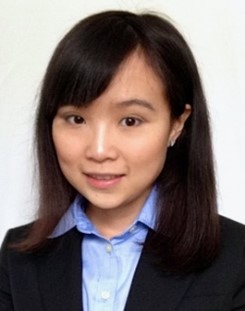
Georgia Institute of Technology
Title of the talk:
Robust and Sequential Detection and Prediction
Yao Xie received the Ph.D. degree in electrical engineering from Stanford University, with a focus on mathematics. She is currently an Associate Professor and the Harold R. and Mary Anne Nash Early Career Professor with the H. Milton Stewart School of Industrial and Systems Engineering, Georgia Institute of Technology and also an Associate Director of the Machine Learning Center. Her research areas are statistics, sequential analysis and sequential change-point detection, machine learning, and signal processing. She received the National Science Foundation (NSF) CAREER Award in 2017. She is also an Associate Editor for IEEE Transactions on Signal Processing.
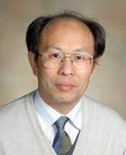
Concordia University
Title of the talk:
Recent Advance in Speech Enhancement with Deep Learning
Wei-Ping Zhu received the B.E. and M.E. degrees in electrical engineering from the Nanjing University of Posts and Telecommunications in 1982 and 1985, respectively, and the Ph.D. degree in electrical engineering from Southeast University, Nanjing, China, in 1991. He was a Postdoctoral Fellow from 1991 to 1992 and a Research Associate from 1996 to 1998 with the Department of Electrical and Computer Engineering, Concordia University, Montreal, Canada. From 1993 to 1996, he was an Associate Professor with the Department of Information Engineering, Nanjing University of Posts and Telecommunications. From 1998 to 2001, he worked with Hi-Tech Companies, Ottawa, Canada, including Nortel Networks and SR Telecom Inc. Since July 2001, he has been with Concordia’s Electrical and Computer Engineering Department as a Full-Time Faculty Member, where he is presently a Full Professor. His research interests include digital signal processing and machine learning, speech and statistical signal processing, and signal processing for wireless communication with a particular focus on MIMO systems and cooperative communication. He was a Guest Editor for the IEEE JOURNAL ON SELECTED AREAS IN COMMUNICATIONS for the special issues of: Broadband Wireless Communications for High Speed Vehicles, and Virtual MIMO from 2011 to 2013. Since January 2020, he has been serving as a Subject Editor for Journal of The Franklin Institute.
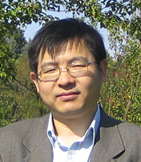
University of Delaware
Title of the talk:
Robust Remaindering for Real Numbers and Its Applications in Mod Sampling
Xiang-Gen Xia received the B.S. degree in mathematics from Nanjing Normal University, Nanjing, China, in 1983, the M.S. degree in mathematics from Nankai University, Tianjin, China, in 1986, and the Ph.D. degree in electrical engineering from the University of Southern California, Los Angeles, CA, USA, in 1992. He was a Senior/Research Staff Member with Hughes Research Laboratories, Malibu, CA, US, from 1995 to 1996. In September 1996, he joined the Department of Electrical and Computer Engineering, University of Delaware, Newark, DE, USA, where he is currently the Charles Black Evans Professor. He is also the author of the book Modulated Coding for Inter Symbol Interference Channels (New York, NY, USA: Marcel Dekker, 2000). His research interests include space–time coding, MIMO and OFDM systems, digital signal processing, and synthetic aperture radar (SAR) and ISAR imaging. Dr. Xia received the National Science Foundation (NSF) Faculty Early Career Development (CAREER) Program Award in 1997, the Office of Naval Research (ONR) Young Investigator Award in 1998, and the Outstanding Overseas Young Investigator Award from the National Nature Science Foundation of China in 2001. He also received the 2019 Information Theory Outstanding Overseas Chinese Scientist Award, The Information Theory Society of Chinese Institute of Electronics. He is also the Technical Program Chair of the Signal Processing Symposium, Globecom 2007, in Washington, DC, USA, and the General Co-Chair of ICASSP 2005 in Philadelphia. He has served as an Associate Editor for numerous international journals, including IEEE Transactions on Signal Processing, IEEE Transactions on Wireless Communications, IEEE Transactions on Mobile Computing, and IEEE Transactions on Vehicular Technology.
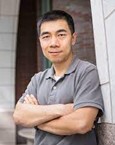
Harvard University
Title of the talk:
Understanding the Universality Phenomena in High-Dimensional
Yue M. Lu was born in Shanghai. After finishing undergraduate studies at Shanghai Jiao Tong University, he attended the University of Illinois at Urbana-Champaign, where he received the M.Sc. degree in mathematics and the Ph.D. degree in electrical engineering, both in 2007. From September 2007 and October 2010, he was a postdoctoral researcher at the Audiovisual Communications Laboratory at Ecole Polytechnique Fédérale de Lausanne (EPFL), Switzerland. He then joined Harvard University, where he is currently Gordon McKay Professor of Electrical Engineering and of Applied Mathematics at the Harvard John A. Paulson School of Engineering and Applied Sciences. He is also fortunate to have held visiting appointments at Duke University in 2016 and at the École Normale Supérieure (ENS) in 2019.
He received the Most Innovative Paper Award of IEEE International Conference on Image Processing (ICIP) in 2006 for his paper (with Minh N. Do) on the construction of directional multiresolution image representations, the Best Student Paper Award of IEEE ICIP in 2007, and the Best Student Presentation Award at the 31st SIAM SEAS Conference in 2007. Student papers supervised and coauthored by him won the Best Student Paper Award (with Ivan Dokmanic and Martin Vetterli) of IEEE International Conference on Acoustics, Speech and Signal Processing in 2011, the Best Student Paper Award (with Ameya Agaskar and Chuang Wang) of IEEE Global Conference on Signal and Information Processing (GlobalSIP) in 2014, and the Best Student Paper (First Prize) of the IEEE CAMSAP Workshop (with Oussama Dhifallah) in 2017. He is a recipient of the 2015 ECE Illinois Young Alumni Achievement Award, and an IEEE Signal Processing Society Distinguished Lecturer (2022-2023).

University of Pisa
Title of the talk:
Cognitive Radars: Some Application and Some Hint on the Future
Maria Sabrina Greco graduated in Electronic Engineering in 1993 and received the Ph.D. degree in Telecommunication Engineering in 1998, from University of Pisa, Italy. From December 1997 to May 1998 she joined the Georgia Tech Research Institute, Atlanta, USA as a visiting research scholar where she carried on research activity in the field of radar detection in non-Gaussian background. In 1993 she joined the Department of Information Engineering of the University of Pisa, where she is Full Professor since December 2016. She’s IEEE fellow since January 2011 and she was co-recipient of the 2001 and 2012 IEEE Aerospace and Electronic Systems Society’s Barry Carlton Award for Best Paper and recipient of the 2008 Fred Nathanson Young Engineer of the Year award for contributions to signal processing, estimation, and detection theory.
Her general interests are in the areas of statistical signal processing, estimation and detection theory. In particular, her research interests include clutter models, spectral analysis, coherent and incoherent detection in non-Gaussian clutter, CFAR techniques, radar waveform diversity and bistatic/mustistatic active and passive radars. She co-authored many book chapters and more than 170 journal and conference papers.
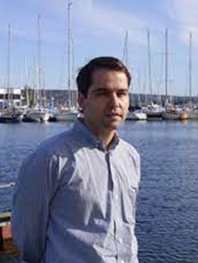
Pontifical Catholic University of Rio de Janeiro, University of York
Title of the talk:
Energy-Efficient Distributed Learning: Diffusion and Federated Algorithms with Applications to IoT Networks
Rodrigo C. de Lamare was born in Rio de Janeiro, Brazil, in 1975. He attended Colégio Santo Inácio and then studied electronic engineering at the School of Engineering of the Federal University of Rio de Janeiro (UFRJ). He received his Diploma in electronic engineering from UFRJ in 1998 and the MSc and PhD degrees in electrical engineering from the Pontifical Catholic University of Rio de Janeiro (PUC-RIO) in 2001 and 2004, respectively. He then worked as a Postdoctoral Fellow from January to June 2005 at the Centre for Telecommunications Studies (CETUC), PUC-RIO and from July 2005 to January 2006 at the Signal Processing Laboratory, UFRJ. Since January 2006, he has been with the Communications Group, Department of Electronics, University of York, United Kingdom, where he is a Professor. Since April 2013, he has also been a Professor at PUC-RIO. Prof. de Lamare is a senior member of the IEEE, served as an elected member of the IEEE Signal Processing Theory and Method and currently serves the IEEE Signal Processing for Communications and Networking technical committees of the IEEE Signal Processing Society. He served as editor for IEEE Transactions on Communications and IEEE Wireless Communications Letters. His research interests lie in communications and signal processing, areas in which he has published over 450 papers in international journals and conferences.
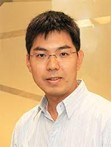
The University of Hong Kong
Title of the talk:
Parameter tuning-free Matrix and Tensor decompositions
Yik-Chung Wu received the B.Eng. (EEE) degree in 1998 and the M.Phil. degree in 2001 from the University of Hong Kong (HKU). He received the Croucher Foundation scholarship in 2002 to study Ph.D. degree at Texas A&M University, College Station, and graduated in 2005. From August 2005 to August 2006, he was with the Thomson Corporate Research, Princeton, NJ, as a Member of Technical Staff. Since September 2006, he has been with HKU, currently as an Associate Professor. He was a visiting scholar at Princeton University, in summers of 2015 and 2017.
His research interests are in general areas of machine learning, signal processing and communication systems, and in particular distributed algorithms, and large-scale optimization theories. Dr. Wu served as an Editor for IEEE Communications Letters, and IEEE Transactions on Communications, and is currently an Associate Editor for IEEE Transactions on Signal Processing, and an Editor for Journal of Communications and Networks. He was a TPC member for over 50 IEEE major conferences. He received four best paper awards in international conferences, with the most recent one from IEEE International Conference on Communications (ICC) 2020. He is a senior member of the IEEE.
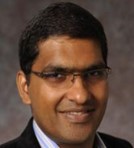
Rutgers University
Title of the talk:
Scalable Algorithms for Distributed Principal Component Analysis
Waheed U. Bajwa has been with Rutgers since 2011, where he is currently an associate professor in the Dept. of ECE and an associate member of the graduate faculty of the Dept. of Statistics and Biostatistics. His research interests include statistical signal processing, highdimensional statistics, machine learning, harmonic analysis, inverse problems, and networked systems. He has received a number of awards including the Army Research Office Young Investigator Award (2014), the National Science Foundation CAREER Award (2015), Rutgers Presidential Merit Award (2016), Rutgers Presidential Fellowship for Teaching Excellence (2017), and Rutgers Engineering Governing Council ECE Professor of the Year Award (2016, 2017, 2019). He is a co-investigator on a work that received the Cancer Institute of New Jersey’s Gallo Award for Scientific Excellence in 2017, a co-author on papers that received Best Student Paper Awards at IEEE IVMSP 2016 and IEEE CAMSAP 2017 workshops, and a Member of the Class of 2015 National Academy of Engineering Frontiers of Engineering Education Symposium. Dr. Bajwa is currently serving as the Lead Guest Editor for a special issue of IEEE Signal Processing Magazine on “Distributed, Streaming Machine Learning, a Guest Editor for a special issue of Proceedings of the IEEE on “Optimization for Data-driven Learning and Control, a Senior Area Editor for IEEE Signal Processing Letters, an Associate Editor for IEEE Transactions on Signal and Information Processing over Networks, and an elected member of the Big Data Special Interest Group and Sensor Array and Multichannel (SAM) and Signal Processing for Communications and Networking (SPCOM) Technical Committees of the IEEE Signal Processing Society.

Federal University of Ceará
Title of the talk:
Tensor-based Approach for IRS Phase-Shift Feedback Control
André Lima Férrer de Almeida received a double Ph.D. degree in Sciences and Teleinformatics Engineering from the University of Nice, Sophia Antipolis, France, and the Federal University of Ceará, Fortaleza, Brazil, in 2007. From 2007 to 2008, he held a one-year teaching position at the University of Nice Sophia Antipolis, France. In 2010, he joined the Teleinformatics Engineering Department of the Federal University of Ceará, where he holds the Signal Processing chair and currently is an Associate Professor. He was awarded multiple times visiting professor positions at the University of Nice Sophia Antipolis, France (2012, 2013, 2015, 2018, 2019). He served as an Associate Editor for several journals, such as the IEEE Transactions on Signal Processing (2012-2014 and 2014-2016), the IEEE Signal Processing Letters (2016-2018 and 2018-2020). He has served as Guest Editor for the EURASIP Journal on Advances in Signal Processing (2014), and the Wireless Communications and Mobile Computing (2018). He currently serves as a Senior Area Editor for the IEEE Signal Processing Letters and as an Associate Editor for the IEEE Transactions on Vehicular Technology. He also served in the Editorial Board of other journals, including Circuits, Systems & Signal Processing (2012-2018), Wireless Communications and Mobile Computing (2018-2020), the KSII Transactions on Internet and Information Systems (2012-2014), and the French journal Traitement du Signal (2016-2018).
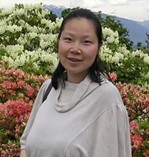
Z. Jane Wang
University of British Columbia
Title of the talk:
Exploring Interpretability of Deep Convolutional Neural Networks
Z. Jane Wang received the B.Sc. degree in electrical engineering from Tsinghua University, China, in 1996, and the M.Sc. and Ph.D. degrees in electrical engineering from the University of Connecticut, in 2000 and 2002, respectively. She has been a Research Associate with the Electrical and Computer Engineering Department, University of Maryland, College Park. Since 2004, she has been with the Department Electrical and Computer Engineering, The University of British Columbia, Canada, where she is currently a professor. Her research interests include statistical signal processing theory and applications, with focus on multimedia security and biomedical signal processing and modeling. While at the University of Connecticut, she received the Outstanding Engineering Doctoral Student Award. She co-received the EURASIP Journal on Applied Signal Processing (JASP) Best Paper Award in 2004, and the IEEE Signal Processing Society Best Paper Award in 2005. She is the Chair and Founder of the IEEE Signal Processing Chapter at Vancouver. She is serving as an Associate Editor for the IEEE Transactions on Signal Processing, the IEEE Transactions on Information Forensics and Security, and the IEEE Transactions on Biomedical Engineering.
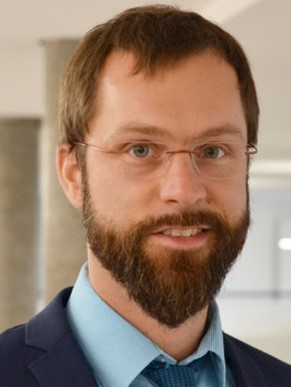
Michael Muma
Technische Universität Darmstadt
Title of the talk:
Ultra-High-Dimensional Signal Processing and Statistical Learning for Biomedical Data
Michael Muma (S’10–M’14) received the Dipl.-Ing (2009) and the Dr.-Ing. (summa cum laude) degree in electrical engineering and information technology both from Technische Universitat Darmstadt, Darmstadt, Germany, in 2014. He completed his diploma thesis with the Contact Lens and Visual Optics Laboratory, School of Optometry, Brisbane, Australia, on the role of cardiopulmonary signals in the dynamics of the eye’s wavefront aberrations. His Ph.D. thesis was on “Robust Estimation and Model Order Selection for Signal Processing.” He is currently a Postdoctoral Fellow at the Signal Processing Group, Institute of Telecommunications and he has recently been awarded the Athene Young Investigator position of Technische Universitat Darmstadt. His research is on robust statistics for signal processing with applications in biomedical signal processing, wireless sensor networks, and array signal processing. He was the Supervisor of the Technische Universitat Darmstadt student team who won the international IEEE Signal Processing Cup 2015, the competition topic was “Heart Rate Monitoring During Physical Exercise Using Wrist-Type Photoplethysmographic (PPG) Signals.” He co-organized the 2016 Joint IEEE SPS and EURASIP Summer School on Robust Signal Processing. In 2017, together with his coauthors, he received the IEEE Signal Processing Magazine Best Paper Award for the paper entitled“Robust Estimation in Signal Processing: A Tutorial-Style Treatment of Fundamental Concepts.”

Telecommunications Technology Center of Catalonia
Title of the talk:
Signal Processing with Large Dimensional Observations: A Random Matrix Theory Approach
Xavier Mestre is currently a Research Director (R4) at CTTC. He received the MS and PhD in Electrical Engineering from the Technical University of Catalonia (UPC) in 1997 and 2002 respectively and the licenciate (5 year) degree in Mathematics in 2011. During the pursuit of his PhD, he was recipient of a 1998-2001 PhD scholarship (granted by the Catalan Government) and was awarded the 2002 Rosina Ribalta second prize for the best doctoral thesis project within areas of Information Technologies and Communications by the Epson Iberica foundation.
He has been Associate Editor of the IEEE Transactions on Signal Processing for two terms (2008-11, 2015-2019), Senior Area Editor of the same journal (2019-present) and associate co-editor of the special issue on at the EURASIP Journal on Wireless Communications and Networking. He is IEEE Senior member and elected member of the IEEE Sensor Array and Multi-channel Signal Processing Technical Committee (2013-2018), the IEEE Signal Processing Theory and Methods Technical Committee (2019-present), the EURASIP Technical Area Committee on Signal Processing in Communications (2018-present) and the EURASIP Technical Area Committee on Theoretical and Methodological Trends in Signal Processing (2015-present). Since 2019 where he is also vice-chair of this last Technical Area Committee. He has been regular member of the evaluation committee of the Spanish Ministry of Science and Education, the Catalan Department of Research and Universities (AGAUR), the Agence National de la Recherche (ANR, France) and several universities (Instituto de Telecomunicações, Université Paris Saclay).
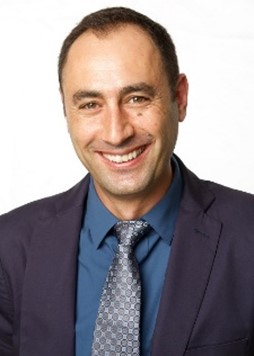
University of New South Wales
Title of the talk:
TBD
Elias Aboutanios received the bachelor’s degree in engineering from the University of New South Wales (UNSW), Kensington, NSW, Australia, in 1997, and the Ph.D. degree from the University of Technology Sydney, Ultimo, NSW, Australia, in 2003. From 2003 to 2007, he was a Research Fellow with the Institute for Digital Communications, University of Edinburgh, where he conducted research on space time adaptive processing for radar target detection. He is currently an Associate Professor with the School of Electrical Engineering and Telecommunications, University of New South Wales, Kensington, NSW, Australia. His research interests are in statistical signal processing, in particular signal detection and parameter estimation, for various applications such as radar, GNSS, smart grids, and nuclear magnetic resonance spectroscopy. He is the recipient of the Best Oral Presentation Award (CISPBMEI10), Teaching Excellence Award in 2011, Excellence in Research Supervision Award in 2014, the Australian Postgraduate Scholarship in 1998, Sydney Electricity Scholarship in 1994, and UNSW Co-Op Scholarship in 1993. He is a member of the IEEE SAM Technical Committee and is currently serving as an Associate Editor for the IEEE Transactions on Signal Processing and IET Signal Processing. He also runs various space activities and projects and has established and led the UNSW-EC0 CubeSat Project, which culminated in the launch of the satellite in 2017.
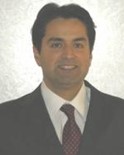
University of Naples Federico II
Title of the talk:
RCS Measurements of UAV: Statistical Analysis and Radar Detection Performance
Antonio De Maio received the Dr. Eng. (Hons.) and Ph.D. degrees in information engineering from the University of Naples Federico II, Naples, Italy, in 1998 and 2002, respectively. From October to December 2004, he was a Visiting Researcher with the U.S. Air Force Research Laboratory, Rome, NY, USA. From November to December 2007, he was a Visiting Researcher with the Chinese University of Hong Kong, Hong Kong. He is currently a Professor with the University of Naples Federico II. His research interest lies in the field of statistical signal processing, with emphasis on radar detection, optimization theory applied to radar signal processing, and multiple-access communications. He is the recipient of the 2010 IEEE Fred Nathanson Memorial Award as the young (less than 40 years of age) AESS Radar Engineer 2010 whose performance is particularly noteworthy as evidenced by contributions to the radar art over a period of several years, with the following citation for “robust CFAR detection, knowledge-based radar signal processing, and waveform design and diversity”. He is the corecipient of the 2013 best paper award (entitled to B. Carlton) of the IEEE Transactions on Aerospace and Electronic Systems with the contribution “Knowledge-Aided (Potentially Cognitive) Transmit Signal and Receive Filter Design in Signal-Dependent Clutter”.
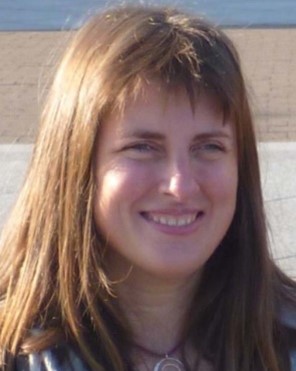
Nuria Gonzalez Prelcic
North Carolina State University
Title of the talk:
Hybrid Model/Data Driven Strategies for Joint Localization and Communication at mmWave
Nuria González Prelcic is currently an Associate Professor with the Electrical and Computer Engineering Department, North Carolina State University. Her main research interests include signal processing theory and signal processing and machine learning for wireless communications and sensing: filter banks, compressive sampling and estimation, multicarrier modulation, massive MIMO, MIMO processing for millimeter-wave communication and sensing, including vehicle-to-everything (V2X), air-to-everything (A2X), satellite MIMO communication, positioning, and joint radar and communication. She has published more than 80 articles in the topic of signal processing for millimeter-wave communications. She is a member of the IEEE Sensor Array and Multichannel Signal Processing Technical Committee. She was the founder Director of the Atlantic Research Center for Information and Communication Technologies (atlanTTic) at the University of Vigo, from July 2008 to January 2017. She is an Editor of the IEEE Transactions on Wireless Communications and an Area Editor of the IEEE Signal Processing Magazine.
